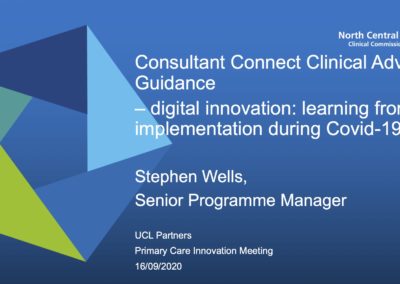Deputy Chief Operating Officer, Carl Holland describes Northampton General Hospital (NGH) as a “District General plus” because in addition to their 800-bed capacity, they have specialist services such as being a Cancer Centre, and providing a county-wide service for Stroke, Vascular, and Renal.
In this article, Carl shares why he decided to try out Referral Triage. At NGH the triage is delivered by an NHS consultant from Consultant Connect’s National Consultant Network, working remotely as part of the local team trust team while the on-the-ground team can focus on seeing and treating patients on the waiting list.
‘We have been working in partnership with Consultant Connect for four years. We started off with traditional Advice & Guidance – now every specialty is covered by this service. Now as we are coming out of COVID, we have decided to seize the opportunity to clear some of our backlogs.’
Watch a 2-minute clip of Carl talking about the service here:
Starting small
‘We had a large backlog in cardiology, and asked Consultant Connect to support us with triaging. We initially started with a very small trial, approximately 100 patients, with an NHS National Consultant Network consultant cardiologist reviewing the cases and triaging the referrals. The consultant cardiologist looked at whether the patients still needed to be seen, if they needed to be seen in acute care, if they could be managed through primary care, if they needed diagnostics before coming to acute care etc.’
Results
‘We were really happy with the results of the small pilot, so we started again but this time with a much bigger list of referrals. We’ve now triaged somewhere in the region of 600 patients and have also started to triage the new referrals coming in at the same time. Of the 600 patients triaged 26% were returned to primary care. We made sure that the GPs had a letter with diagnostics requested (where necessary) and a full explanation of what was required before they needed to be referred in.
Those patients who did need to be seen were triaged into urgent and routines, and into whether they needed to be seen face-to-face or virtually. We’ve managed to reduce the demand, but also managed to fast-track patients who are potentially acutely unwell into the hospital for urgent treatments.
We have now started using Consultant Connect’s service to focus on the new referrals coming in – so a front door triage approach. If we can reduce the number of new patients coming in, we can then concentrate on clearing the backlog further.’
Key results to date*:
- 3,150 referrals triaged
- Average triage time: 13.5hr
- Average turnaround time on e-RS: less than 72hrs
- Outcomes:
- 20% of referrals are marked as urgent and prioritised for diagnostics and a telephone or face-to-face consultation.
- 44% of referrals are booked into diagnostics and a routine outpatient appointment arranged (face-to-face for 41% of cases and via a telephone consultation for 3%)
- 4% of referrals are booked directly into an appointment, without additional diagnostics being needed
- 27% of referrals are returned to GPs in primary care with advice of which 20% include a recommendation to arrange tests
- 5% of referrals are redirected to another hospital service
*Data correct as of February 2022
Patient Case Study
Dr Patrick Davey is an NHS consultant from Consultant Connect’s National Consultant Network, working remotely as part of the local team. He shares his experience of the service along with a recent patient case study example:
‘I look at all the referrals to cardiology, grade and deal with them. It is a really helpful system as it means virtually all the referrals go through one person so there’s a consistency and opportunity to building relationships with GPs.
I recently came across a patient who had been seen for a minor procedure in a nearby hospital. The patient was just about to have the procedure when the stand-by anaesthetist said, “let’s stop the operation, the heart’s going far too slow, it’s going 33, 34 beats per minute” So, they stopped the operation, did an ECG and sent the patient home. The ECG was then given to the GP, and this was added to the referral to cardiology which I reviewed. I immediately recognised this dangerous slow heart rhythm, so we got the patient into hospital and put a pacemaker in. In this situation the GP referral was certainly lifesaving.
It’s highly likely that the referral through a more standard route would have had the same outcome, the difference however is that the electronic nature of the referrals has short circuited the referral process. So, one might say that this patient had a pacemaker a week or more early, and that week could easily have been the week in which their heart stopped.’
Watch a clip of Dr Davey talking about the patient case study:
Related Links:
- National Health Executive – Carl Holland: The success of front door triage in Northamptonshire
- Referral Triage
- FAQs – Referral Triage
To find out how this could work in your area, please call us on 01865 261 467 or email hello@consultantconnect.org.uk





